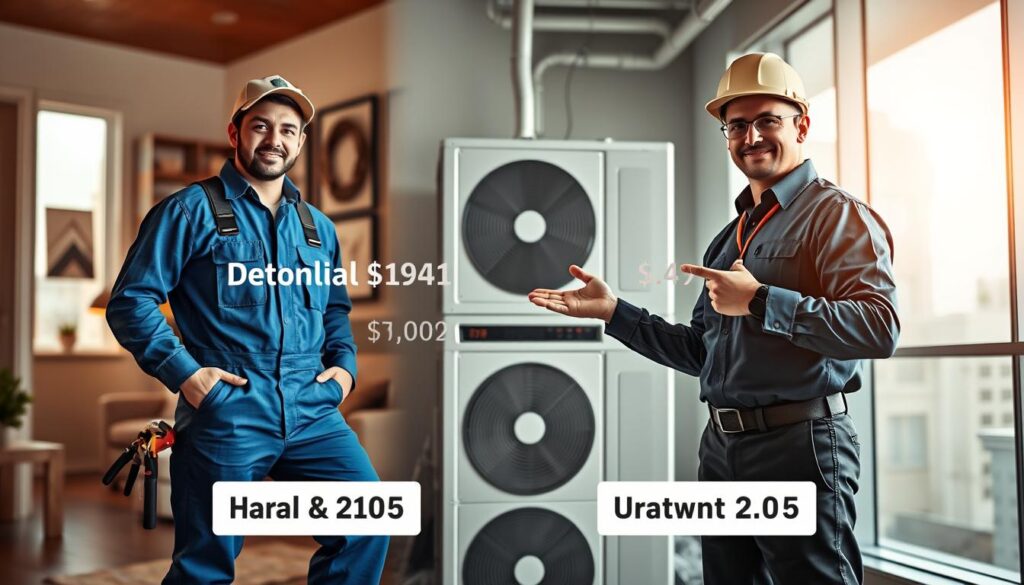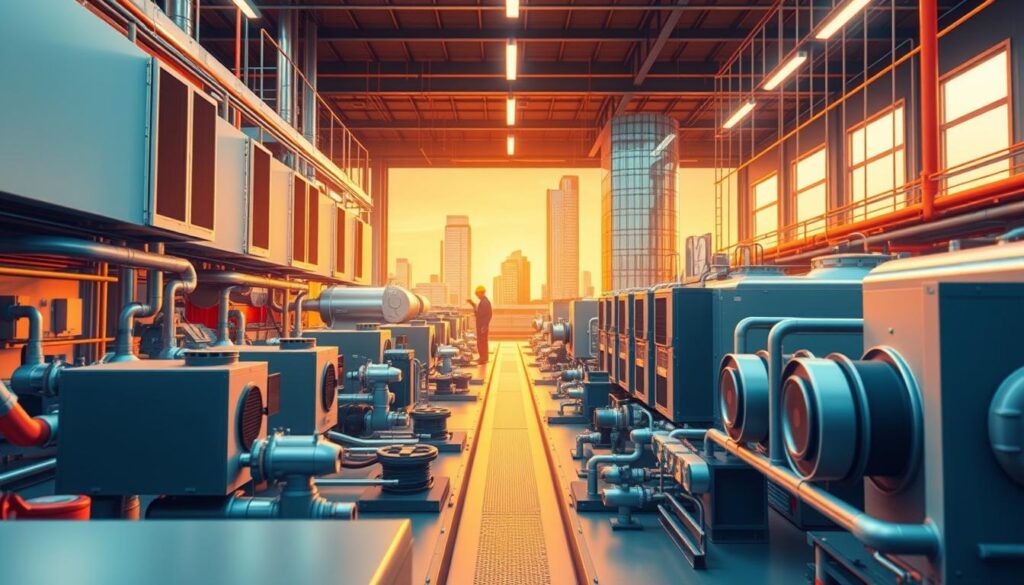Affiliate Disclosure
HVAC Guide Guys is a participant in the Amazon Services LLC Associates Program, an affiliate advertising program designed to provide a means for sites to earn advertising fees by advertising and linking to Amazon.
How Much Do HVAC Installers Make a Year? Are you thinking about a career that pays well? The HVAC installation field is a great choice. It offers good money and exciting work. Learning how much HVAC installers earn can help you decide if it’s right for you.

HVAC installer salaries are changing fast. New technicians can make good money right from the start. As they gain more experience, their pay can really grow.
How much you can earn as an HVAC installer depends on a few things. These include where you work, what you specialize in, and how skilled you are. If you’re looking to start or grow in this field, knowing the salary range is key.
Key Takeaways
- HVAC installer salaries vary widely based on experience and region
- Entry-level technicians can expect competitive starting wages
- Specialized certifications can significantly boost earning
- Urban areas typically offer higher compensation rates
- Continuous skill development drives salary growth
Table of Contents
National Average HVAC Installer Salary Overview
Thinking about becoming an HVAC installer? Knowing the average salary is key. The HVAC field pays well, but pay varies for many reasons.
The U.S. Bureau of Labor Statistics says HVAC techs have a good income. It’s a stable job with chances to make more money as you grow.
Base Salary Range Insights
HVAC installers usually make a certain amount based on their skills and demand. Here are some salary details:
- Median annual wage: $48,730
- Entry-level positions: $35,000 – $42,000
- Experienced installers: $50,000 – $65,000
- Top 10% earners: $75,000+
Additional Compensation Opportunities
HVAC installers can also get extra money through different ways:
- Performance bonuses
- Overtime pay
- Seasonal work incentives
- Commission structures
Your earnings can change based on where you work, your skills, and certifications. Getting better at your job can really increase your income.
Explore Our HVAC Shop
Looking for top-rated HVAC tools, parts, and accessories? Visit our shop and find the perfect solution for your needs.
Visit the ShopHow Much Do HVAC Installers Make a Year?
Exploring HVAC installer salaries shows a range that grows with experience. Earnings vary based on skills and years of work. This makes HVAC a promising career for many.
Your earnings as an HVAC installer change as you advance in your career:
- Entry-Level Technicians: Start at about $54,100 a year
- Intermediate Technicians: Make around $65,700 yearly
- Senior Technicians: Can earn up to $77,200 annually
Knowing how salaries increase helps plan your HVAC career. Here’s a look at what you might earn at different levels of experience:
| Experience Level | Annual Salary Range | Career Stage |
|---|---|---|
| Entry-Level | $54,100 | Initial Learning Phase |
| Intermediate | $65,700 | Skill Development |
| Senior | $77,200 | Expert Specialization |
Your salary can grow with specialized skills and advanced certifications. As you become more skilled in HVAC installation, you’ll attract better-paying jobs.
Top-Paying States for HVAC Installers
Thinking about becoming an HVAC installer? Where you live can really affect how much you earn. Some places pay much more than others. So, choosing where to work is key to making more money.
Highest Paying Locations
Recent data shows the best places for HVAC jobs. These areas offer great chances to earn more:
- California: Leads with an average salary of $59,200
- New Jersey: Offers competitive wages around $58,300
- Washington: Provides strong compensation at $58,000
- New York: Ranks high with salaries near $56,500
- Massachusetts: Demonstrates strong market demand with $55,700
Contributing Factors to Regional Salary Variations
Several things affect how much HVAC installers make:
- Cost of living in big cities
- Local economic health
- Construction and infrastructure projects
- How complex HVAC needs are in the area
- Strength of unions and bargaining power
Knowing these factors can help you plan your HVAC career. It can help you earn more in heating and cooling installer wages.
Explore Our HVAC Shop
Looking for top-rated HVAC tools, parts, and accessories? Visit our shop and find the perfect solution for your needs.
Visit the ShopRegional Salary Variations
Your salary as an HVAC technician can change a lot based on where you work in the United States. The place you are in greatly affects how much you earn. This is because different areas have different costs of living and job demands.
HVAC jobs pay differently in different parts of the country. Things like the local economy, weather needs, and how many people live there all play a part. These factors can make a big difference in how much you get paid.
- Coastal and urban areas usually pay more
- Rural places often pay less
- Places with very hot or cold weather need special HVAC skills and pay more for them
To understand these differences better, here’s a detailed look at how salaries vary by region:
| Region | Average Annual Salary | Key Factors |
|---|---|---|
| Northeast | $58,000 – $65,000 | High population density, complex infrastructure |
| Southwest | $52,000 – $60,000 | High heat demand, residential growth |
| Midwest | $48,000 – $55,000 | Seasonal temperature variations |
| Southeast | $50,000 – $57,000 | Hot climate, consistent air conditioning needs |
Knowing these regional differences can help you plan your HVAC career better. It can also help you make more money.
Experience Level Impact on Earnings
Your earnings in the HVAC field grow with your skills and experience. As you gain more experience, your income can rise significantly.
Knowing how experience affects your earnings is key to planning your career. The HVAC industry offers great financial rewards for those who keep learning and growing.
Career Progression Stages
HVAC professionals see their salaries grow at different stages:
- Entry-Level (0-2 years): Starting salaries range from $35,000 to $45,000
- Mid-Level (3-5 years): Earnings increase to $50,000 – $65,000
- Experienced (6-10 years): You can earn $70,000 – $85,000
- Senior Level (10+ years): Top earners can reach $90,000 – $110,000
Skill Development Strategies
To boost your earnings, keep learning and improving your skills:
- Pursue advanced technical certifications
- Stay updated with emerging HVAC technologies
- Develop specialized expertise in complex systems
- Improve communication and customer service skills
Investing in your growth increases your value in the market. It also leads to better-paying jobs in the HVAC industry.
Explore Our HVAC Shop
Looking for top-rated HVAC tools, parts, and accessories? Visit our shop and find the perfect solution for your needs.
Visit the ShopCommercial vs Residential Installation Pay Rates

When looking at hvac technician income, it’s important to know the difference between commercial and residential work. Commercial HVAC jobs usually pay more because they are more complex and require special skills.
Here are the main differences in hvac installer salary between commercial and residential work:
- Project Scale: Commercial jobs have bigger, more complex systems
- Technical Complexity: They use advanced equipment that needs special skills
- Installation Duration: Commercial projects take longer to complete
- Skill Specialization: Having expertise means you get paid more
Residential HVAC jobs offer steady work but pay less. Your income depends on:
- Where you live
- How much experience you have
- Any technical certifications you have
- Who you work for
Those who get trained for commercial systems can earn 20-30% more than those focused on residential work.
Specialization is key to maximizing your HVAC installation earnings.
Whether to choose commercial or residential work depends on your career goals, skills, and what you want to earn.
Certification and Education Effects on Salary
Boosting your HVAC career means investing in certifications and education. These steps can greatly affect your salary and career growth. Staying ahead in the HVAC field is all about professional growth.
Knowing the right certifications can lead to better pay for HVAC pros. Your dedication to learning shows in your career earnings.
Essential Professional Certifications
- NATE (North American Technician Excellence) Certification – A top industry standard
- EPA Section 608 Certification – Needed for refrigerant handling
- State-specific HVAC licensing
- Manufacturer-specific training
Advanced Qualifications
Getting specialized certifications can really boost your worth. Look into extra credentials that show you’re an expert in certain HVAC areas or tech.
- Commercial HVAC systems specialization
- Energy efficiency certifications
- Advanced refrigeration techniques
- Building automation systems training
Investing in your growth is smart for HVAC earnings. Each certification is a chance to stand out and earn more.
Industry Growth and Salary Trends

The HVAC industry is growing steadily, opening up great opportunities for those looking for good salaries. The U.S. Bureau of Labor Statistics says there will be a lot of growth in this field.
Several things are making the industry grow:
- More people want energy-saving HVAC systems.
- New climate control technologies are coming out fast.
- The construction and renovation markets are getting bigger.
- There’s a bigger push for sustainable buildings.
Your earnings as an HVAC pro can really grow with these trends. New tech like smart thermostats and green cooling systems are changing things. They’re creating new jobs and chances for advancement.
The HVAC sector is expected to see continued growth, with skilled technicians positioned to capitalize on expanding market needs.
New tech means higher salaries for those who keep learning. Getting trained in the latest HVAC tech can make you earn more and stand out.
With more construction and tighter environmental rules, HVAC pros with many skills will be in demand. This could increase your salary and job chances.
Explore Our HVAC Shop
Looking for top-rated HVAC tools, parts, and accessories? Visit our shop and find the perfect solution for your needs.
Visit the ShopBenefits and Additional Compensation
When looking at an HVAC technician’s income, don’t just focus on the base salary. Top employers give out great compensation packages. These packages can really increase your total earnings.
Typical benefits for HVAC pros include:
- Health insurance coverage
- Dental and vision plans
- 401(k) retirement savings programs
- Paid vacation and sick leave
- Disability and life insurance
Getting paid based on your performance can also raise your salary. Many companies offer extra money for things like:
- Annual performance bonuses
- Profit-sharing programs
- Commission structures for more installations
- Tool and equipment allowances
Advanced certifications and specialized skills can lead to better pay. Experienced HVAC technicians with extra training often get top benefits and salaries.
Investing in your professional growth can really boost your earnings in the HVAC field.
Conclusion
Looking into how much HVAC installers make a year shows a promising career. It offers good pay and growth. By focusing on learning and growing, you can earn well.
Your earnings in the HVAC field depend on many things. These include where you work, how long you’ve been doing it, your skills, and the type of work. Keeping up with new tech helps you find better jobs.
The HVAC world is stable and pays well for those who are skilled and willing to learn. Getting more certifications and gaining experience can really boost your earnings. Planning your career well and aiming for excellence can make your job very rewarding.
If you’re new or want to move up, HVAC offers many ways to make money. Knowing about salaries, where you can work, and what’s in demand helps you make smart choices. This way, you can increase your earnings and enjoy your job more.

